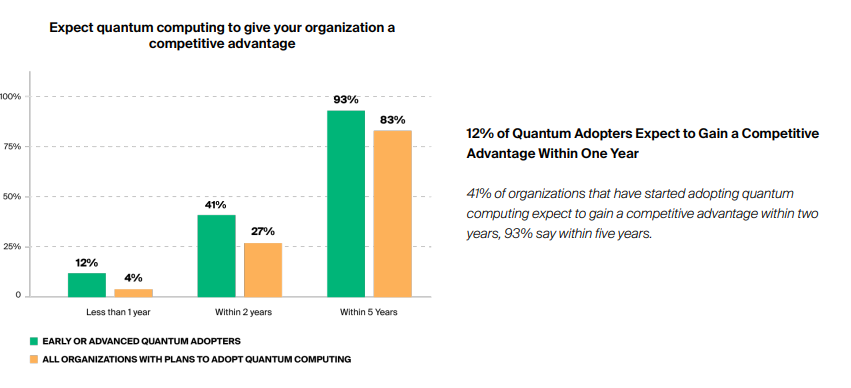Q&A with Brandon Rodenburg: Quantum's disruptive potential and the impact of NQI
Optica Blog
Q&A with Brandon Rodenburg: Quantum's disruptive potential and the impact of NQI
Leah Poffenberger, Corporate Communications Manager, Optica
Quantum computing and quantum information science is a fast-growing industry as governments across the world are joined in its funding by private sector investments betting on its potential. Brandon Rodenburg, Quantum team leader at MITRE and Optica Ambassador, sat down with Discover Optica to talk about challenges facing the industry, where quantum computing could go next, and the impact of the U.S. National Quantum Initiative.
Editor’s note: This interview has been edited for length and clarity.
Discover Optica: World events ranging from the war in Ukraine to the global COVID-19 pandemic have shown how susceptible our supply chain management is to external factors. From your perspective, has the quantum industry supply chain been impacted?

Brandon Rodenburg
Brandon Rodenburg: These things are complicated, but the easier answer is yes, if we’re thinking about specifically the supply chain, it has been impacted. Companies like Rigetti Computing have been reporting they are adjusting their road maps, explicitly calling out supply chain issues. Part of the problem for quantum is that we don’t have a set market right now.
For the quantum industry, the more pressing problem than the supply chain issue is that we have a shortage of people. At this point, companies are desperate to hire. We [in the National Lab system] have trouble finding people. Since companies can generally pay more than national labs, they just can’t compete financially. There are a lot of positions going unfilled. There is a large-scale effort at the government level to develop a pipeline for the quantum workforce. This is a deep problem: You have to get primary school kids interested to fill the jobs in 10 years. People are the critical thing that’s missing.
DO: So this “supply chain shortage” is a long-standing issue in quantum, not caused by recent events. Why is there a shortage of labor in quantum specifically?
BR: This is an issue of a field that has grown faster than we can scale up the number of people who are training to be part of it. This is natural growth pain. There are other fields where, if a major breakthrough happens, you could tap into latent talent. As an example—if gene editing with CRISPR takes off and revolutionizes medicine, there are a lot of people with backgrounds in biology who may not currently be in research that you can tap into for that industry. It’s not clear if we have that same depth of latent talent that already exists in the quantum information space. This aspect is probably more unique to quantum than to some other fields that could blow up to be the next hot thing.
DO: In a Quantum 2.0 panel in Boston, panelists noted large-scale government investments in quantum research from Europe, China, Japan, and the U.S. At the same time, we are seeing more companies like IBM, Google, Alibaba, Microsoft and Amazon in the competition to adopt quantum computing as an ordinary tool for business. What area of investment will drive quantum technologies into mainstream business?
BR: This is kind of the million-dollar question. We do know of applications, specifically for quantum computing, where a mature system could be disruptive. There’s a sense that quantum computing will change large swathes of society—just like computers disrupted so many things we didn’t predict.
Quantum computing will enable many applications. Zapata Computing, a quantum software company, did a survey of 300 executives, not technical people, of companies making at least 250 million in revenue, with at least 1 million in computational resources, meaning they are doing something that requires high-performance computing. Of those surveyed, 93% believed that quantum computers would impact their bottom line within 5 years. There’s a question of how much is hype, but there’s a perception that in every industry using high-performance computing—a lot of our society—quantum could have an impact.

Image Credit: Zapata Computing
There are the obvious players—those developing new materials, like car companies making better batteries with quantum simulation or the pharmaceutical industry conducting drug discovery research. But most large companies could benefit from using quantum computing in areas of logistics. Take FedEx planning routes for its drivers. If you could make these routes 1% more efficient, you just reduced costs significantly. The scales of these companies are such that if optimization can make things marginally better, it makes a big difference to the bottom line.
We’re starting to see a shift in the last 2 years there are a lot more companies created in quantum software and application space than those developing the hardware itself. This could be putting the cart before the horse, but if you believe the tech is going develop into something useful, and that we’re getting close, it makes sense. Billion dollar companies are created out of being the first to make these connections between the technology and end uses. There are some guesses of where quantum technology could be disruptive and a lot of hype that it could be anywhere.
DO: What industries or disciplines do you most and least expect to be disrupted by quantum computing technology?

Quantum simulation could lead to materials that limit the loss of electricity through powerlines, reducing energy needs.
BR: Many people expect quantum computing to disrupt Shor’s algorithm, which could break all our existing cryptography, I don’t think this will be a major application. Quantum computers aren’t magic and don’t solve all problems—there are problems that are hard for both quantum and classical computers. NIST has already announced the algorithms that are part of the new standard for cryptography. If you have a quantum computer that is strong enough to break cryptography, they’ve already solved this problem.
The area I’m most confident in having an impact is quantum simulation. Simulating quantum systems—like chemical systems or exotic physics—that are computationally difficult. Traditional computers already revolutionized many of these fields, and we now will have devices that can use brute force to simulate the degrees of freedom these systems have. Quantum simulation will impact the pharmaceutical industry by speeding up drug discovery, which will probably save about a billion dollars. It will also impact materials science. New materials have been an invisible superhero behind new technology, and it’s the hope that quantum simulation will lead to high-temperature superconductors. If we can replace energy transmission through powerlines—which have a 20% energy loss—with no-loss superconducting lines, we have effectively increased energy production by 20%.
DO: In 2012, the National Research Council called for a National Photonics Initiative (NPI) to increase collaboration and coordination among U.S. industry, government and academia to identify and further advance areas of photonics critical to regaining U.S. competitiveness and maintaining national security. In the past ten years, how have you experienced the impact of this initiative?

NPI brought photonic integrated circuit production to the upstate New York area through AIM Photonics.
Image Credit: AIM Photonics
BR: I have been impacted in a more direct and a less direct way. Directly, NPI was ramping up as I was leaving academia, where I had a more traditional optics focus. I went to graduate school in upstate New York at The Institute of Optics at the University of Rochester, the birthplace of Optica. A lot of NPI initiatives really impacted the upstate New York region: building AIM photonics—a fabrication facility for photonic integrated circuits that anyone could access—really impacted research in that area.
One of the horses in the quantum race is photonics based—and being an optics person, I’m hoping that one wins—a quantum computer for which the actual computation itself is done with light. It’s really hard to imagine this not happening except on photonic integrated circuits NPI opened things up for people researching this, particularly in the upstate NY area.
The second, less direct impact: towards the tail end of NPI, there started to call for a National Quantum Initiative (NQI). Optica, or OSA at that time, formally wrote a letter to congress saying we need an NQI. NPI was seen as enough of a success to be a model or an exemplar for what is now NQI. A lot of NQI’s legacy comes from Optica and its successor the NPI.
DO: Optica and its members were at the forefront of the National Quantum Initiative, signed into law in the U.S. in 2018. Why do you think it is important for Optica members to be involved in quantum-related advocacy efforts?
BR: A lot of quantum technologies won’t work without significant optics-based research supporting them. In particular, you probably can’t do the hardest types of problems you could want a quantum computer to do with a single device. This is no different than computers now—we don’t have one giant computer, we build networks. A unique challenge in the quantum domain is getting information on and off of chips, into a cable that carries information, and then transferring it back to a quantum processing unit. It’s hard to believe optics isn’t the solution. The easiest “pipe” is an optical fiber since we’d most likely send information as light by sending photons between stationary qubits for qubit-qubit entanglement across chips. You say we can use microwaves, but this would require cryogenic tubes. If we were to succeed beyond our wildest dreams in making quantum computers, there is the discussion of how we create a network to have a quantum internet. We could maybe use a cryogenic pipe across the US to send quantum information through a coaxial cable—but there is a reason our internet’s backbone is fiberoptic cable. That is probably the only feasible way to build long-distance quantum networks. This is quantum optics.
Optics sit right at the center of quantum networks. Optics plays a central role in much of quantum information technologies. It’s not a coincidence that NQI came out of something like Optica. Optics is the heart of a lot of these technologies.
